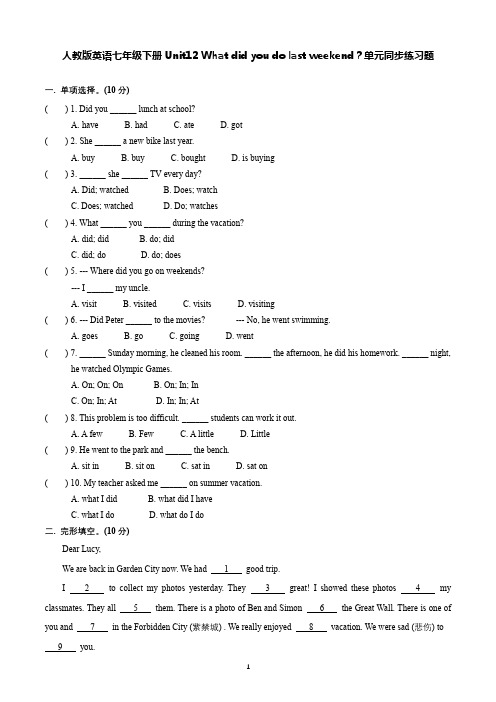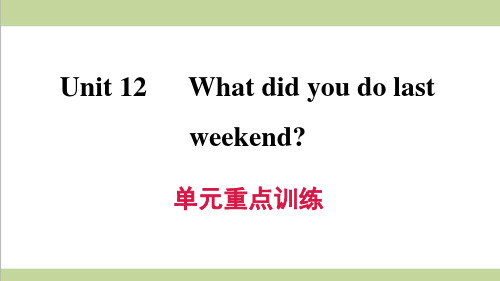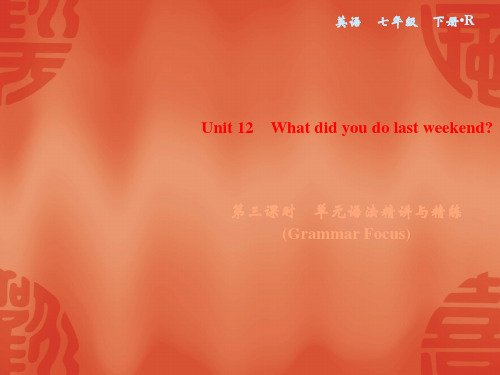最新人教版初中英语七年级下册Unit12语法指导与练习
【初中英语】人教版七年级下册Unit 12 What did you do last week练习题

人教版七年级下册Unit 12 What did you do lastweekend?(911)1.森林家庭野营La s t we e k o u r f a mil y we n t to th e Fo r e s t Fa mil y C a mp.It wa s re a lly g r e a t.It is ap la c e 1 TV s, c omp u te r s o r c a r s, 2 it h a s s o mu ch f un.A s so o n a s(一……就……) we 3 a t th e c a mp, we f ou n d lo ts o f in te r e s tin g th in g s.In th e mo r n ing,we p la ye d with o th e r 4 .T h e y we r e f ro m d iff e r e n t p lac e s.In th ea f te r n oo n, my mo th e r a n d my s is te r 5 str a wb e r r ie s in the f o re s t.M y f a th e r an d I 6in a b e au tif u l la k e.In th e e ve n ing,it wa s th e imp o r ta nt f a mil ytime.We7 o u r e ve n in g s ittin g b y th e la k e a nd ta lk ing.Wh e n we f e lt 8, we we n t to o u r te n t to s lee p.It is o u r f ir s t time to g o to th e c a mp, b u t it 9be the la s t time.We will goth e r e 10 n ex t s umme r.A nd we ho p e yo u r f a mil y c a n jo in u s,too.(1)A.witho u tB.withC.b yD.fo r(2)A.a n dB.soC.bu tD.o r(3)A.p u tB.fo u ndC.wen tD.a r r ive d(4)A.c h ild r enB.tea c he r sC.s tud en tsD.a n ima ls(5)A.b o ug h tB.wa sh edC.p ic k edD.g r e w(6)A.s le p tB.s wa mC.f le wD.mo ve d(7)A.wa tc h edB.ke p tC.s ta r te dD.sp en t(8)A.h a pp yB.tir edC.sc a r edD.b u s y(9)A.c a nB.mu s tC.willD.wo n't(10)A.e ith e rB.a lsoC.ag a inD.o n ly2.词汇积累:f ind v.发现;找到la ke n.湖泊imp o r ta n t a d j.重要的s le e p v.睡觉jo in v.加入从“词汇积累”中选择合适的单词并用其适当的形式填空。
人教版英语七年级下册 Unit12 单元同步练习题(有答案)

人教版英语七年级下册Unit12 What did you do last weekend?单元同步练习题一. 单项选择。
(10分)( )1. Did you ______ lunch at school?A. haveB. hadC. ateD. got( )2. She ______ a new bike last year.A. buyB. buyC. boughtD. is buying( )3. ______ she ______ TV every day?A. Did; watchedB. Does; watchC. Does; watchedD. Do; watches( )4. What ______ you ______ during the vacation?A. did; didB. do; didC. did; doD. do; does( )5. --- Where did you go on weekends?--- I ______ my uncle.A. visitB. visitedC. visitsD. visiting( )6. --- Did Peter ______ to the movies? --- No, he went swimming.A. goesB. goC. goingD. went( )7. ______ Sunday morning, he cleaned his room. ______ the afternoon, he did his homework. ______ night, he watched Olympic Games.A. On; On; OnB. On; In; InC. On; In; AtD. In; In; At( )8. This problem is too difficult. ______ students can work it out.A. A fewB. FewC. A littleD. Little( )9. He went to the park and ______ the bench.A. sit inB. sit onC. sat inD. sat on( )10. My teacher asked me ______ on summer vacation.A. what I didB. what did I haveC. what I doD. what do I do二. 完形填空。
最新人教版初中英语七年级下册Unit12SectionA教材全解

人教版初中英语七年级下册Unit12SectionA教材全解Unit 12 What did you do last weekend?Unit 12 Section A教材全解1.go boating去划船【重点注释】这是“go+doing”结构的短语,类似的还有:go swimming/fishing/shopping/skating/camping去游泳/钓鱼/购物/滑冰/野营。
2.camped by the lake在湖边野营【重点注释】①camp此处作不及物动词,意为“扎营,宿营”,常用短语go camping 意为“去野营”,camp out意为“野营;露营”。
例如:We camped near the beach.我们靠近海滩宿营。
Where did you camp last night?昨晚你在哪里宿营了?They often go camping on summer holidays.他们经常在暑假去野营。
I went camping with my friends last Sunday.上星期日我和朋友们去露营了。
The students love camping out on summer holidays.学生们喜欢在暑假中露营。
【拓展记忆】camp还可作名词,意为“野营,营地“,可构成词组:summer camp 夏令营,winter camp冬令营。
例句:Let’s go back to the camp.It’s getting dark.我们回营地吧。
天快黑了。
We had a good week at the camp.我们在营地过了愉快的一周。
Did you go to summer camp last year?去年你参加夏令营了吗?②by the lake在湖边,by此处是介词,意为“在……旁边”、“在……近旁”、“在……手边”,此时要注意它与介词near有所不同,即by表示的距离更“近”。
人教版初中英语七年级下册Unit12SectionA教材全解

人教版初中英语七年级下册Unit12SectionA教材全解Unit 12 What did you do last weekend?Unit 12 Section A教材全解1.go boating去划船【重点注释】这是“go+doing”结构的短语,类似的还有:go swimming/fishing/shopping/skating/camping去游泳/钓鱼/购物/滑冰/野营。
2.camped by the lake在湖边野营【重点注释】①camp此处作不及物动词,意为“扎营,宿营”,常用短语go camping意为“去野营”,camp out意为“野营;露营”。
例如:We camped near the beach.我们靠近海滩宿营。
Where did you camp last night?昨晚你在哪里宿营了?They often go camping on summer holidays.他们经常在暑假去野营。
I went camping with my friends last Sunday.上星期日我和朋友们去露营了。
The students love camping out on summer holidays.学生们喜欢在暑假中露营。
【拓展记忆】camp还可作名词,意为“野营,营地“,可构成词组:summer camp夏令营,winter camp冬令营。
例句:Let’s go back to the camp.It’s getting dark.我们回营地吧。
天快黑了。
We had a good week at the camp.我们在营地过了愉快的一周。
Did you go to summer camp last year?去年你参加夏令营了吗?②by the lake在湖边,by此处是介词,意为“在……旁边”、“在……近旁”、“在……手边”,此时要注意它与介词near有所不同,即by表示的距离更“近”。
人教版七年级下册英语 Unit 12 单元重点习题练习课件

8. —____A____ wonderful the music is! What's its name?
—Victory.
【2019•宿迁】
A. How B. How a C. What D. What a
【解析】wonderful是形容词,在句中作表语, 用how引导感叹句。故选A。
9. —____A____ beautiful shoes she is wearing!
—I think so.
【2018•百色】
A. What B. What a C. How
D. How a
【解析】用语法判定法。此句感叹部分是 “形容词+可数名词复数”,故使用what引 导感叹句,故选A。
10. —Could you please help me ___A_____ the picture on
用put up,故答案选A。
本单元以“谈论过去的经历”为话题, 请用课本 所学词汇、句型写一篇30~50词的有关周末活动的 小短文。
_____W_e__w__e_n_t_c_a_m__p_i_n_g__in__a__s_m__a_ll__v_i_ll_a_g_e__la_s_t_ _w_e_e_k_e_n_d_._W__e__to_o_k__a__lo_n_g__b_u_s_r_i_d_e__to__a_l_a_k_e_._O__n_ _S_a_t_u_r_d_a_y_n__ig_h_t_, _w__e _p_u_t__u_p__o_u_r_t_e_n_t_s _a_n_d__m__a_d_e_ _a__fi_r_e_t_o__co_o_k__f_o_o_d_._T__h_e_n_, _w_e__s_a_n_g__a_n_d__d_a_n_c_e_d_ _n_e_a_r__th_e__f_ir_e_.__O_n__S_u_n_d__a_y__a_ft_e_r_n_o_o_n_, _w__e__w_e_n_t_ _b_a_c_k_h__o_m_e_.________________________________
2020春人教版七年级英语下册课件:Unit 12 单元语法精讲和精练 (Grammar Focus

Unit 12 What did you do last weekend? 第三课时 单元语法精讲与精练 (Grammar Focus)
一般过去时的运用(二) 一般过去时态的特殊疑问句 1.特殊疑问词 提问人用 who/whom;提问物用 what;提问地点用 where;提问时间用 when/what time;提问原因用 why;提问情况、感受等用 how。 2.结构 (1)be 动词:特殊疑问词+was/were+主语+其他?eg:Where were you last week?上周你在哪儿? How was your last summer vacation? 你去年暑假过得怎么样?
பைடு நூலகம்
单元语法精练 Ⅰ.用所给词的适当形式填空。 1.Jim and Lily came (come) to China last month. 2.Ted didn’t go (not go) to bed until 12 o’clock last night.So he got (get) up late this morning. 3.There was (be) no one here a moment ago. 4.I listened but heard (hear) nothing. 5.The students in our school spent (spend) lots of time going over their lessons last week.
(2)根据句意确知某一动作发生在过去,用一般过去时。 eg:Edison invented many useful things. 爱迪生发明了许多有用的东西。 (3)有时间、让步或结果状语从句的,一般主句用过去时,从句也用过去时。
七年级下册英语Unit12练习册答案人教版
⽆忧考为⼤家整理的七年级下册英语Unit 12练习册答案⼈教版的⽂章,供⼤家学习参考!更多最新信息请点击Unit 12 section A ⼀.A)1.has 2.are watching 3.playing 4.did 5.bought (B) 6.fight 7.outside 8.classroom 9.else 10.hall ⼆. CBDCD 三.1Can eat e to 3.No don’t 4.Don’t listen 5.other things 四 1. thoes rules 2.sports shoes 3.arrive late for 4.in the dining hall 5.at classroom outside 五.CAFDE Section B ⼀.(A)1. on 2.to 3. from to 4.at on 5.in by at (B) 6.children 7.talking 8.any 9.her 10.speaking ⼆.1~5. DCABC 6~10. CDADD 三.1.Do have to 2.Don’t run3.Can play4.have fun5. can’t have to 四.1.Do you usually help your mom make dinner? 2.Don’t talk loudly in the classrooms! 3.I have to go to bed by 10 o’clock. 4.Do have to go to the Children’s Palase to learn the paino? 5.Can you meet friends at night? 五.1~5.CABDA 6~10CBDCA 六.Welcome to School Library 2.Don’t take your food into the libray or eat in here . 3.它们会使书本潮湿。
人教版初中必刷题英语七年级下册unit 12 单元
人教版初中必刷题英语七年级下册unit 12 单元一、单元知识点梳理。
(一)重点词汇。
1. camp.- 读音:英 [kæmp] 美 [kæmp]。
- 词性:名词和动词。
- 含义:作名词时意为“营地;帐篷”;作动词时意为“扎营;宿营”。
- 例句:We went camping in the mountains last weekend.(我们上周末去山里露营了。
)。
2. lake.- 读音:英 [leɪk] 美 [leɪk]。
- 词性:名词。
- 含义:“湖;湖泊”- 例句:There is a beautiful lake near my hometown.(我的家乡附近有一个美丽的湖泊。
)。
(此处可继续罗列本单元其他重点词汇,如beach, badminton等,并按照上述格式进行解释)。
(二)重点短语。
1. go camping.- 含义:去露营。
- 例句:They often go camping in spring.(他们经常在春天去露营。
)。
2. play badminton.- 含义:打羽毛球。
- 例句:She likes playing badminton with her friends.(她喜欢和她的朋友们打羽毛球。
)。
(同样继续罗列其他重点短语,如go fishing, take a walk等并举例)。
(三)重点句型。
1. What did you do last weekend?- 含义:你上周末做了什么?- 回答通常用一般过去时描述过去做的事情,例如:I went fishing.(我去钓鱼了。
)。
2. Did you go to the beach?- 含义:你去海滩了吗?- 这是一般过去时的一般疑问句,回答用Yes或No,例如:Yes, I did. / No, I didn't.(罗列其他重点句型并进行解释和举例)。
二、单元练习题。
(一)单项选择。
人教新目标版初中英语七年级下册第12单元复习Unit 12 单元语法聚焦
单元语法聚焦十二语法精讲一般过去时态的特殊疑问句一、定义以疑问词开头,对句子中某一部分进行提问的句子叫作特殊疑问句。
常见的疑问词(组)有what , who , whose , where , which , why , how , what time , what color , how old , how long , how many , how much , how often , how soon 等。
二、答语回答特殊疑问句时,不能用yes 或no 简要回答,而针对问句所提问的内容作相应的回答。
---What did you eat yesterday evening ?昨天晚上你吃什么了?---I ate a banana and two apples .我吃了一根香蕉和两个苹果。
三、一般过去时的特殊疑问句结构一般过去时的特殊疑问句通常有以下两种情况:1.特殊疑问词+was /were +主语+其他?When were you at home ?你什么时候在家?2.特殊疑问词+did + 主语+动词原形+其他?Where did you go last summer ?去年夏天你去哪里了?语法精炼I 对画线部分提问1.They took some great photos in the park last Sunday ._______ _____ they _______ in the park last Sunday ?2.I went to the supermarket with my mother this afternoon ._______ _______ you _____ with your mother this afternoon ?3.Mike lost his key last Saturday .________ ______ Mike ______ his key ?4.Ann was late for work this morning .________ _____ late for work this morning ?5.They didn’t like the movie because it was boring ._______ _______ they _____ the movie ?6.Their school trip was very relaxing .______ ______ their school trip ?II. 用适当的动词或括号内所给单词的适当形式填空1. ---Did you _____(have ) a good weekend ?---Yes. I ______ . I _______(have ) a nice weekend . I _____(go) to the movies .3.---What ____he _____ (do ) yesterday evening ?---He ______(study) for the English test .3 --Did you ______(have ) noodles for breakfast yesterday ?-- No, I ______. I _____(get ) up late . I just ______(drink ) a cup of coffee . But I _____(eat ) a lot for lunch .4 --- I _____(go) to the movies last weekend . How about you ?---I ______(not do ) my homework . I ______(visit) my grandma.5 ---What did you do yesterday ?---We _____(play) basketball on the playground . We ______(be ) very happy .7.Where ______Mr. Green usually ______ (do) some reading last year ?III. 根据短文内容,从方框中选择恰当的单词并用其适当形式填空,有两词多余。
- 1、下载文档前请自行甄别文档内容的完整性,平台不提供额外的编辑、内容补充、找答案等附加服务。
- 2、"仅部分预览"的文档,不可在线预览部分如存在完整性等问题,可反馈申请退款(可完整预览的文档不适用该条件!)。
- 3、如文档侵犯您的权益,请联系客服反馈,我们会尽快为您处理(人工客服工作时间:9:00-18:30)。
精品文档 精品文档 人教版初中英语七年级下册Unit12语法指导与练习 Unit 12 What did you do last weekend?
Unit 12语法指导与练习 语法指导
【教材原句】 1. ——What did you do last weekend? ——I did my homework./We went boating. 2. ——Where did she go last weekend? ——She went to a farm. 3.——Who did she go with? ——She went with her classmates. 4.——Who visited her grandma? ——Betty did. 以上4句均为 和 引导的特殊疑问句,且句子的时态为 时态。(what;where;who;一般过去) 【语法透析】 一、一般过去时的各种句型 一般过去时,分两种情况:一是be动词的一般过去时;二是行为动词的一般过去时。一般过去时:有be(was/were)无行为动词,有行为动词无be(was/were)。It was a beautiful day.是个美好的日子。Grandma cooked fish.奶奶煎鱼了。 1.一变:肯定句变为否定句 【技巧1】当句中含有情态动词could,would,should等时,可直接在他们后面加not构成否定句。I could get you a concert ticket.我能给你一张音乐会的票。→I could not/couldn’t get you a concert ticket.我不能给你一张音乐会的票。 【技巧2】当句中含有连系动词was/were时,可直接在它们后面加not构成否定句。I was on the Internet when you called me.你给我打电话时我正在上网→I was not/wasn’t on the Internet when you called me.你给我打电话时我们在上网。 【技巧3】当句中谓语是除情态动词、助动词、连系动词(was/were)以外的动词时,在该动词之前加did not(didn’t),动词还原为原形,构成否定句。The famous singer sang some Chinese songs.这位著名的歌手唱了几首中文歌曲。→The famous singer didn’t sing any Chinese songs.这位具名的歌手没有唱中文歌曲。 2.二变:陈述句变为一般疑问句 【技巧1】移动词语的位置。将was,were,could,would,should等移到句首。He could pack his things himself.他能自己把东西打包。→Could he pack his things himself? 【技巧2】添加助动词did。谓语是除情态动词、助动词、连系动词(was/were)以外的动词时,在主语之前加did,动词还原。Mr. Li looked very old.李先生看起
一般过去时态(Ⅱ) 精品文档 精品文档 来很老。→Did Mr.Li look very old?李先生看起来很老吗? 3.三变:陈述句变为特殊疑问句 【技巧1】确定疑问词:人who/whom,物what,地点where,时间when/what time,原因why,频率how often,长度how long,距离how far等。They gave the concert last night.他们昨晚举办了音乐会。→When did they give the concert?他们何时举办了音乐会? 【技巧2】辨认结构形式:疑问词+情态动词/助动词/was/were+主语+其他?The accident happened near the station.那起事故是在车站附近发生的。→Where did the accident happen?那是事故是在哪里发生的? 二、一般过去时的判断 1.当句中用到表示过去的时间状语,用过去时。这样的状语有: a.yesterday,如:yesterday morning,at five o’clock yesterday. b.last,如:last week,last monthe,last year,last Sunday afternoon. c.ago,用“一段时间+ago”表示“……(多久)以前”,如:ten years ago,5 minutes ago,three weeks ago. d.表示过去的时间短语,如:in the 90s,on May 1st1892,in the old days(过去的日子里),just now,the other day(前几天),once upon a time(很久以前),before liberation(解放前),When I was8 years old…(当我八岁时),at+一个时间点. 2.根据句意确知某一动作发生在过去,用一般过去时,如:Edison invented many useful things.爱迪生范明了许多有用的东西。 3.有时间、让步或结果状语从句的,一般主句用一般过去时,从句也用过去时,如:The man drank some water after he got up in the morning. 4.一般过去时表示过去经常或反复发生的动作,常和often,always,once a week等表示频度的时间状语连用,如:Mrs.Peter always carried an umbrella.彼得太太过去老是带着一把伞。 【试题链接】Tony football every weekend when he was young.. A.plays B.played C.is playing D.has played (时间状语every weekend when he was young.指的是过去,故句子用一般过去时态。答案:B) 5.有些句子,虽然没有表示过去确定时间的状语,但实际上时指过去发生的动作或存在的状态的话,也要用一般过去时。如:I didn’t know you were in Paris.我不知道你在巴黎(因为在说话时,我已经知道你在巴黎了。这句话指的是说话者之前,所以只能用过去时态表示。实际上,这句话暗指:But now I know you are here.) 【试题链接】——What the noise,Bill? ——Sorry,I broke my glass.. A.is B.was C.has been D.will be (由下文中的broke可知,句子是一般过去时,由句意“比尔,是什么噪音?对不起,我打坏了玻璃。”) EXERCISES: 一、选择填空。 ( )1.What Peter do last weekend?. A.do B.does C.did D.was ( )2. you TV last night? 精品文档 精品文档 A.Do;watch B.Did;watch C.Did;watched D.Does;watch ( )3.When did you there? A.arrive B.arrives C.arrived D.arrive in ( )4.——Who went to the beach? ——Lisa . A.do B.does C.did D.was ( )5.Tom usually up at 5:30 in the morning,but this morning he up at 6:00. A.gets;gets B.got;got C.gets;got D.get;got 二、根据句意,用所给词的适当形式填空。 1.Jim and Lily (come)to China last month. 2.Ted (not go)to bed until 12 o’clock last night.So he (get)up late this morning. 3.There (be)no one here a moment ago. 4.I listened but (hear)nothing. 5.The students in our school (spend) lots of time (go) over their lessons last week because of the test. 6.My mother (not do)housework yesterday because of illness. 7. your father (go)to work every day last year? 8.——What Mary (do)on Sunday morning? ——She (watch)TV and (read)an interesting book. 9.—— (be)your mother a shop assistant last year? ——No,she (not be). 10.I (have)an exciting party last weekend. 11. We ______ (live) in Japan last year. 12. Jack________ (stop) the car last Sunday. 13. Tom _____ (clean) my room and ______(study) for the Chinese test last weekend.14.What ______ you ______(do) last night? 15.On Sunday morning I _______(play) tennis. 16.What_______ (do) your father do last Monday? 17.Tom (study) English last night. 18.They (go) to the park last Saturday afternoon. 19.We ( have) a class meeting last Tuesday afternoon. 20.He (watch) TV over the weekend. 21.Lily_______ (swim) last Sunday. 22.The boys_______ (visit) his uncle last Friday 三、句型转换,按要求改写句子。 1.I went to the beach with my parents last Sunday.(对画线部分提问)
